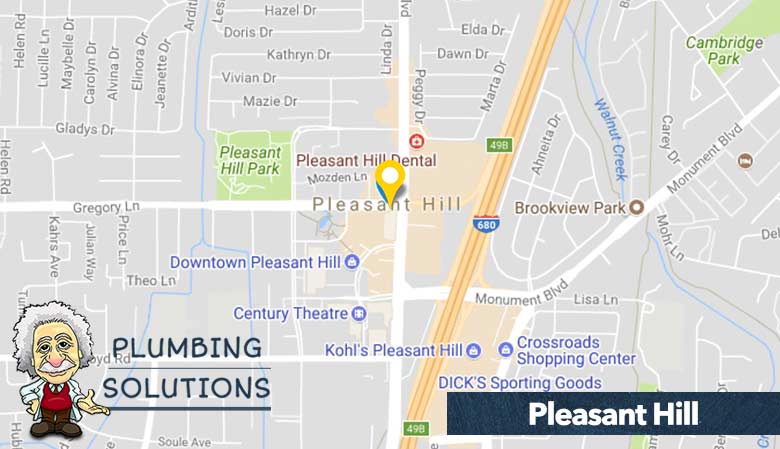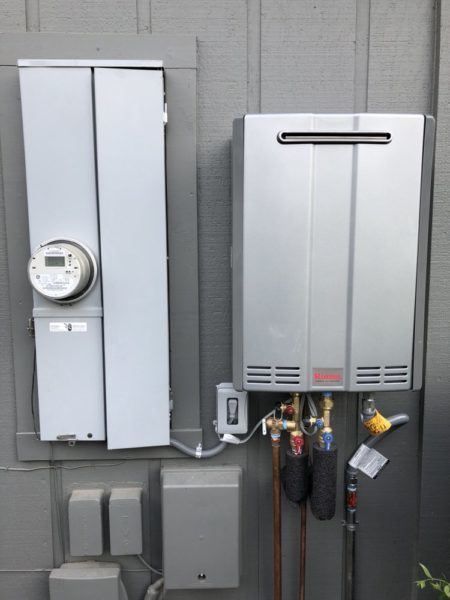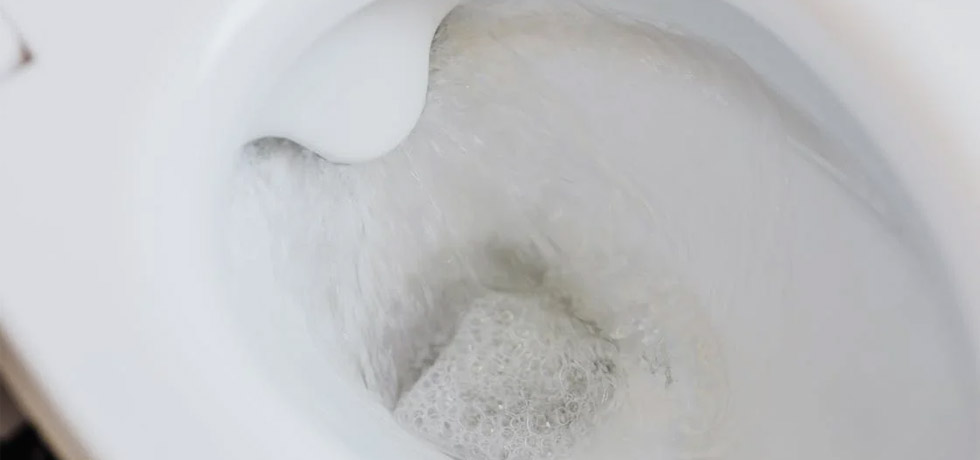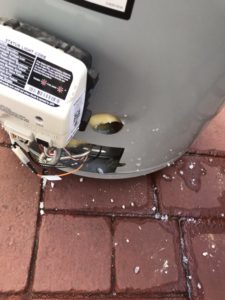When you have a team of reputable plumbers at your disposal, you don’t have to panic when a plumbing related problem pops up. Broken water heaters and water leaks happen to everyone from time to time, but it’s how you react that makes the difference. Rather than scrambling around looking at online reviews and trying to find a decent plumber, just call Plumbing Solutions and we will come in and take control.
For residents of Pleasant Hill, California, we are the go-to choice for plumbing and water heater services. We provide same-day service and use an upfront, flat-rate pricing model to ensure you never pay more than is necessary. Our satisfaction guarantee and solid warranties will leave you with peace of mind and our trusted plumbing experts will always respect your home as if it were their own.

Your Full Service Plumber
- Water heater repair & installation
- Tankless water heaters
- Boilers
- Sump pumps
- Gas lines
- Re-pipes
- Water leak detection
- Slab leak repair
- Bathroom plumbing
- Bathroom remodeling
- Kitchen plumbing
- Bathtubs
- Showers
- Garbage disposals
- Sinks and faucets
- Toilets
- Water softeners
- Sewer inspections
- Sewer repair
- Sewer jetting
- Drain cleaning
- And more
Trusted Plumbing Installation and Repair
Plumbing services like water leak detection, slab leak repair, drain cleaning, trenchless sewer repairs, hydro jetting, and more are what set us apart from other plumbing repair and plumbing installation companies. When you call us for information about a service we offer, you can feel confident knowing that we will give an honest assessment of the problem and find a solution that is both long-lasting and cost-effective. From the most minor repair to the most extensive replacement, we will get the job done. If you’re living in or near Pleasant Hill, Plumbing Solutions are your local experts in all things plumbing. Contact us for more information on the price we charge for a specific service and to schedule your next appointment today!
Affordable Drain Cleaning Services
When you need a drain cleaning in Pleasant Hill, Plumbing Solutions is the team to go to. If you start to notice an inch or two of standing water leftover after every shower, or that your kitchen drains are constantly clogged, there’s a good chance that you need a professional drain cleaning. You might think that using a chemical cleaner like Liquid Plumr or Drano is the best and most affordable way to clear household clogs, but this couldn’t be further from the truth. In reality, liquid drain cleaners pose a threat to both the environment and the pipes in your home’s plumbing system.
These cleaners are made from corrosive acids and solvents that are powerful enough to break down the plastic or metal piping in your home’s plumbing system. Ultimately, you’re going to need to replace these weakened pipes with new ones, which is much more expensive than calling up your local plumber for a routine drain cleaning.
Our professional plumbing contractors in Pleasant Hill have years of experience clearing drains and are outfitted with all the latest gear necessary to complete your repair with as little disruption to your day as possible. We offer a full range of advanced plumbing services, including pressurized hydro-jetting, video camera inspections, trenchless sewer repairs, and more. So, the next time you need a drain cleaning, be sure to give Plumbing Solutions a call right away.
What are customers saying about Plumbing Solutions?
I called them at 8am and they were here at 8:30. Ed went right to work and unclogged our drains quickly. Ed was professional and courteous. I highly recommend Plumbing Solutions!
– David A. – Read more reviews
Toilet Repair Pleasant Hill, CA
When the most important fixture in your bathroom needs to be repaired, Plumbing Solutions has got you covered. A broken toilet can take the fun out of even the best of days, and coming home to one after a long day of work can be downright disheartening. Fortunately for those living in Pleasant Hill, our team of professional plumbers at Plumbing Solutions is perfectly capable of fixing anything that might be wrong with your toilet.
Even though it might seem like most toilet repairs are fairly simple and easy to DIY, this is often not the case. The toilets in your home or business are at the head of a complex plumbing system that can need a range of different repairs, depending on which components fail or malfunction.
The toilet issues we are most commonly called for include:
- Leaks
- Difficulty Flushing
- Clogs
- Constant Running
- Ghost Flushes
- Low Wate Levels
- Constantly Running
- Overflowing
The plumbers sent out by Plumbing Solutions have years of experience and are licensed and insured for all the work they do. Not only are they qualified to handle residential plumbing systems, but they’ve also been regularly trained to work on commercial plumbing repairs and installations. We’re up to date with state and city building codes and regulations, and we come to each job fully equipped to begin work. So, when you need a toilet repair in Pleasant Hill, be sure to give our team of plumbing experts a call.
Sewer Line Repair and Replacement Services
Nothing is worse than dealing with a broken sewer line. What can start out as a thin, hairline crack in your drain or sewer line can quickly become a major break that allows massive amounts of wastewater to flood out across your property—contaminating everything that it comes into contact with along the way.
Sometimes, the cause of a broken sewer line can be out of the property owner’s hands, such as in the case of a natural disaster or a municipal error. In other cases, however, a sewer line in need of repair has either deteriorated over time or has developed a major clog due to a buildup of debris over time. Invasive tree roots growing into and around your sewer line can also disrupt their positioning, causing breaks to slowly form.
Not sure if you have a problem with your sewer lines? If you have a break in your lines, you’ll quickly be able to tell based on the smell alone. Other, less obvious signs, include slow drains and standing water after showers or using sinks. Sewer line issues can be especially problematic for commercial properties and the businesses that operate from them.
If you’re in need of a sewer line repair or replacement in Pleasant Hill, California, then you’re in luck. Plumbing Solutions has a team of dedicated sewer and drain line experts who are licensed, bonded, and insured to work on your lines.
Not only do they have years of experience, but they also arrive in a van fully equipped with all the tools and equipment they might need to assess and begin repairing your sewer and drain lines. So, what are you waiting for? give our pros a call today to get started!
 Water Heater Repair & Installation
Water Heater Repair & Installation
There is no need to worry if you notice trouble with your water heater, as long as Plumbing Solutions is on the job.
We provide hot water heater repair and water heater replacement services that ensure you have access to the hot water you need. Out water heater repair services are built on having a cross-trained team that can service most major brands of equipment, and keeping replacement parts on hand so less time is spent waiting for them to arrive. That allows us to provide faster, more reliable water heater repairs for gas and electric models.
Our most in-demand water heater services include:
- Water heater not running
- Water heater shuts off too soon
- Pilot light won’t stay on
- Water heater leaking
- Water heater making banging, whistling, or squealing sounds
- Water heater leaking at base
- Hot water discolored or smells odd
- Water heater flushes
- Water heater repiping
When it comes to water heater replacement, we offer both tanked and tankless water heaters. Tanked heaters offer all the same upsides you’re used to, at a price point that typically does not require financing. We only install hot water heaters from trusted manufacturers with generous warranties, so your system will be covered for years to come.
Learn more about our water heater services »

We Also Cover Tankless Water Heaters
If you want to make sure that hot water is available at all times, you may want to consider switching to a tankless model.
Tankless water heaters take up a fraction of the space of tanked heaters, and you will save money on operating costs because water won’t need to be kept hot in the tank all day long. While tankless water heaters do provide nonstop hot water to one or two fixtures, please be aware that the water isn’t instantly hot, since it still needs to travel through the same pipes. There are also limits on how many fixtures can use hot water at the same time, so it might not be your best choice if you have multiple people in your home using showers simultaneously.
If you want instantly hot water at specific points throughout your home, we also install instahot water heaters. These units typically supply one appliance or room with hot water within seconds, which can be great for a remote bathroom or guest house bathroom.
Learn more about our tankless water heater options or call now to speak with a specialist.
What to Look For in a New Water Heater
If it’s time to finally replace your water heater, several key factors should be considered to ensure you select the best option for your needs. Here’s a helpful ordered list of what to look for:
1. Fuel Type: Determine whether you need an electric, gas, or solar water heater. Your choice will depend on energy availability, cost, and environmental considerations. It almost always costs less to install the same kind of water heater you had before, so no new utility hookups need to be installed.
2. Capacity: Calculate the water demand in your household to choose the right tank size. A larger family typically requires a higher-gallon capacity unit. If you’re looking at tankless water heaters, then gallons per minute is usually a better way to estimate your needs.
3. Energy Efficiency: Opt for a water heater with a high Energy Factor (EF) rating to reduce energy consumption and lower utility bills.
4. Heating Speed: Consider the recovery rate, which indicates how quickly the unit can reheat water. Faster recovery is essential for busy households.
5. Space and Installation: Ensure you have enough space for the water heater and assess installation costs, especially if you’re switching fuel types.
6. Warranty: Check the manufacturer’s warranty, and consider investing in a unit with an extended warranty for peace of mind. Also make sure that your plumber offers their own warranty.
7. Maintenance and Repairs: Research the availability of replacement parts and ease of maintenance for the chosen water heater brand and model.
8. Cost: Compare initial purchase price, installation costs, and long-term operating expenses to make an informed financial decision.
9. Safety Features: Look for safety features like temperature controls, pressure relief valves, and anti-scald devices to protect your household.
10. Reviews and Recommendations: Read customer reviews and seek recommendations from professionals to gauge the performance and reliability of the water heater brand and model you’re interested in.
BBB A+ Rated Plumbing Experts in Pleasant Hill, California
For the experts in repairs related to plumbing, sewer, and drains, call the plumbers at Plumbing Solutions. We offer repair and installation services for anything plumbing related, and we only charge our customers the most reasonable price. Plumbing Solutions is a BBB rated business that has been serving the areas near Concord, California for years now. So, if you’re home or business is located in Concord and you need a quick response for your plumbing issue, we’re the local plumbers to turn to. Give us a call today for more information or to schedule your next appointment.
Water Leak Detection Services in Pleasant Hill
When you hold off on getting a leak detection and repair service for your home or business, you not only risk further damaging your property, you also significantly increase the chances of getting an unexpectedly high repair bill. Over time, water that leaks from your pipes can build up in between your walls, ceilings, and floors. This could, at the very least, cause significant mold growth. At its worst, water damage from a leaking pipe can grow large enough to collapse entire sections of your property.
That’s why it’s incredibly important to schedule an appointment with a professional plumbing company like Plumbing Solutions as soon as you notice any signs of a leak. Our team of plumbers has years of experience completing leak detection and repair services in Pleasant Hill and the surrounding area. The first thing we’ll do is come to your property for an inspection. From there, we’ll assess the damages and give you an estimate before starting any work. Once everything has been agreed to, our plumbing experts will get started on repairing your water leak.
Gas Line Repairs & Replacements
Usually, a traditional gas line repair or replacement project takes days of digging up your yard, driveway, and even the bordering sidewalk to access the gas line that lies underneath your property. Fortunately for those in the Concord area, our team of skilled technicians at Plumbing Solutions is fully equipped with the best in trenchless technology, which allows us to complete gas line repairs or replacements as quickly and effectively as possible.
If your utility company is the first to notice a gas leak on your property, they are likely to cut off your gas service until you have a professionally licensed technician make the necessary repairs. Once your lines are repaired, you’ll need to show proof that the work was done by a professional to your gas utility company.
These safety measures are put in place to not only protect your home and the safety of your family, but also for the safety of your neighbors and the surrounding properties. It also ensures that the job is done right the first time, effectively preventing any further issues in the future.
Whole-Home & Partial Repipes in Pleasant hill
A lot of plumbers in Pleasant Hill don’t offer whole-home repipes or don’t actually want to do the work. That’s because a whole-home repipe isn’t something you can teach to a new hire in a few weeks: it takes years of hands-on experience, a lot of labor, and a lot of complex problems solving to fully repipe a home.
At Plumbing Solutions, we have a dedicated home repipe team that can handle an entire home in just a couple of days. Relying on a dedicated repipe team means that they can focus on what they know best, so your job will always go smoothly.
Our team uses flexible PEX piping for most repipe jobs, since it’s extremely flexible, significantly less expensive than copper, and more than durable enough for long term use. For some limited applications, we may also use type M copper.
To learn more about our repiping policies and options, or to schedule your on-site estimate, call today.
Bathroom Plumbing Services
Our team is fully equipped and prepared to help with:
- Toilet clogs, toilet repair, toilet replacement
- Sink leak repair, bathroom sink repair, bathroom sink replacement
- Vanity installation
- Bathtub and shower clog repair, faucet repair, hardware replacement
Learn more about our bathroom plumbing services »
Toilet Repair & Replacement

A broken toilet can seriously throw your day off. Whether it’s backing up water all over the floor, not flushing when you expect it to, or running constantly, there’s only so long you can ignore a broken toilet.
The good news is that it doesn’t have to stay broken for long. Our plumbers can quickly repair any standard height or comfort height toilet in record time, thanks to their superior training, large collection of replacement parts, and dedication. If your toilet is significantly older and ready for replacement, we can also help you pick a model that will be a perfect fit for years to come.
Learn more about our toilet repair services or call to get started.
Serving Greater Contra Costa
If you need a plumber in Pleasant Hill, that’s great. But what about Walnut Creek, Concord, or Orinda?
Our team proudly serves greater Contra Costa county, so help is never far away. Call now to get started.
Don’t forget to browse through our reviews and testimonials to find out what others in your area think of our services.

 Water Heater Repair & Installation
Water Heater Repair & Installation